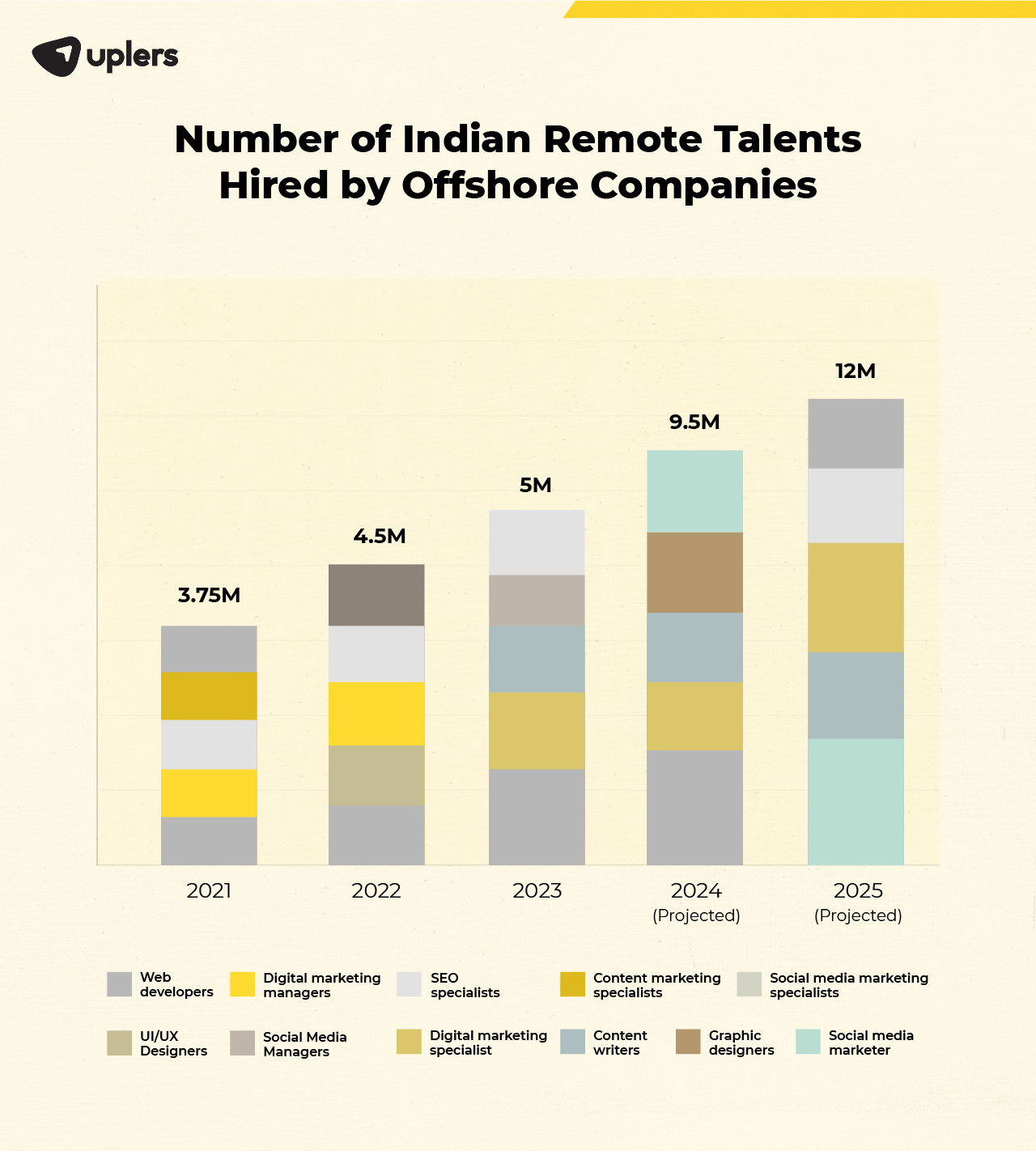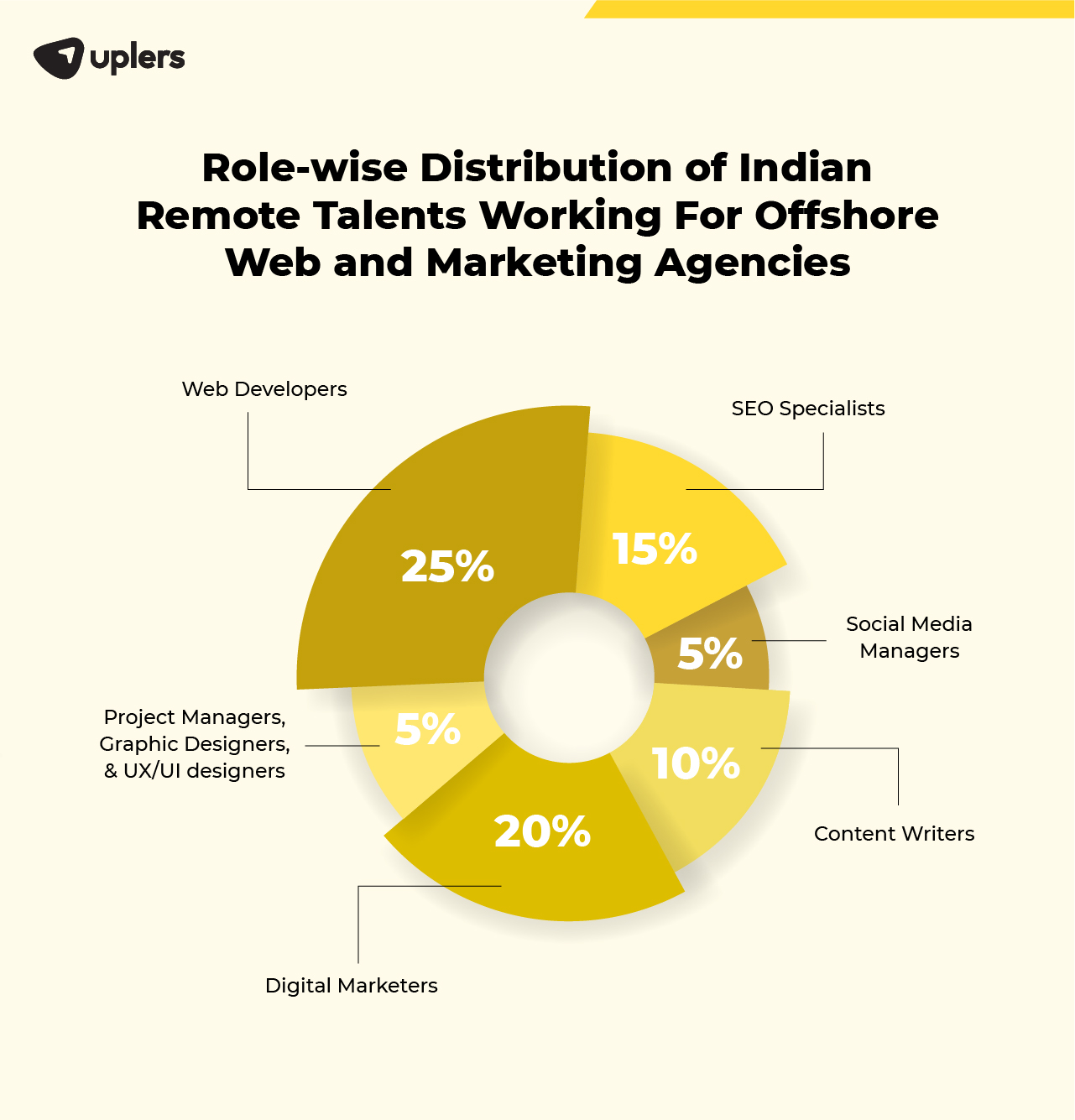Pros And Cons of Hiring Remotely From India: An Ad Agency’s Guide on Offshore Hiring
- Raunak Jain
- November 27, 2023
- 6 Minute Read

16% of all companies, including ad agencies from US/UK/AUS/SA, are hiring remote talents from offshore regions. This is because it is becoming increasingly difficult to find skilled talents locally, especially for niche tech and digital roles which are crucial for business growth, like UI/UX Designer, Digital Marketing Manager, etc. Furthermore, small to medium-sized agencies with limited resources are finding it difficult to attract top local talents while competing with large global agencies.
Several ad agencies are also facing extreme competition from non-traditional tech firms who are setting up in-house agencies. This is reflected in their decreasing revenue which is increasing the margin pressures. Long hiring cycles (global average is 44 days) also impacts revenues and billing, as the agencies cannot onboard talent during an ongoing client project.
Korn Ferry, in their report titled “Future of Work Findings”, predicted that by 2030, the world will face a shortage of 85 million skilled human tech talents. The majority of this shortage will be in Latin America and Asia Pacific with almost 18 million, followed by the United States and China with 12 million, and Australia, EU, and Russia will lack 6 million skilled professionals. Left unchecked, global businesses will have to incur a loss of $8.5 trillion in unrealized annual revenues.
The report also predicts that by the same time, India will be the only country with a surplus of 1.3 million human tech talents. This leads to an indicator that since a lot of global companies are now offshore hiring or outsourcing to India, the country has definitely become a dominant choice.
Ad agencies across the globe need tech talents too, to keep up with the growing competition and meet client demands. While the talent pool in LatAm, East EU, and East Asia will shrink in the coming years, India will consistently generate a wide network of skilled talents, enough for global requirements.

The Pros – Why Global Companies Prefer To Hire Remote Talents From India
“India has an abundance of tech and digital talents. Indian talents are smart and hardworking, which is why I wanted to hire them.” – Baris Agacdan, Director at Dentakay Turkey.
According to a 2022 report, offshore companies are expected to spend $200 billion on talent acquisition and retention in India by 2025. This represents a growth of approximately 10% per year from 2022.

- These statistics prove the depth of India’s talent pool for various digital and tech roles, at a time when the rest of the world is struggling to find qualified profiles.
- Another aspect that sets Indian talents apart is their willingness to constantly upskill themselves as per the industry’s demands. 83% of Indian professionals plan to upskill in 2023 against the global average of 74%, as per Upskilling Trends Report 2023 by Great Learning.
- Such a resourceful talent pool coupled with up to 40% more cost-effectiveness than US, UK, AUS, and SA talents, are motivating global agencies to overcome the economic downturn and offshore hire without compromising on skills.
These pros have made India the prime destination for agencies looking for digital talents. However, it is up to the employers to decide if outsourcing to India or offshore hiring is indeed right for them and which hiring method to adopt before listing the job requirements.
The Cons – When Offshore Hiring From India Becomes Overwhelming
The biggest mistake global employers make before outsourcing to India or offshore hiring is not knowing how to approach India’s complex landscape to find and hire the top remote talent. Hence, the disadvantage begins from the recruiter’s process, and not from the challenges of the hiring destination.
A lot of global employers enter the Indian job market to find cost-effective alternatives to their expensive local talents. While there are other benefits too, the low salaries of Indian talents are a crucial factor for convincing fast-paced businesses with limited budgets and resources. However, this quest for cost-efficiency on hiring blinds employers of the challenges in the Indian hiring landscape.
There is no denying that hiring from a densely populated country like India can be an overwhelming experience for a global hiring manager. Without knowledge about the landscape, culture, the process, and what type of hiring method is right for you- this can lead to hiring the wrong-fit. This affects the productivity and retention of the company.
- The average time to hire in India is 41 days, consisting of shortlisting (10 days), technical assessment (14 days), interviews (12 days), and onboarding (5 days). However, large-scale enterprises want to hire top talents within 10 days. Such a huge margin means agile businesses have to settle for other profiles and delay operations and deadlines till the vacancy is filled.
- While looking for top talent, companies also have to consider if a candidate will be the ‘right fit’, which means both technically proficient and adaptable to the work culture. It is fairly easy to assess the technical skills, but employers need to deep dive into the candidate’s behavior and soft skills to assess their cultural adaptability.
- Employers must make a conscious effort to bridge the cultural gap and embrace diversity. Currently, several employers do not have the expertise or tools to bridge this gap, which is why 32% of Indian remote talents left their jobs in 2022. Businesses need to acknowledge that cultural alignment is crucial for identifying and retaining the best talents for their company.
- The root of these problems is the approach towards offshore hiring. Employers have to look for profiles that meet their requirements, align with their culture, and fit into their budget. These priorities, in their order, will help them find the perfect talent for their organization.
“The entire remote hiring and management process was very overwhelming for us. We were looking for the ‘right fit’ who would align with our time zone and org culture, but there were too many things to manage at once and the long onboarding times didn’t help either. Ultimately, we had two choices – seek expert help or pause remote hiring for a while” – Hiring manager of a reputed advertising agency
12% of digital agencies are hiring only remote talents and this number will keep growing. India, being the most preferred talent-sourcing destination, has an obvious advantage of attracting more companies and helping them overcome the talent crunch. However, the above pros and cons are subjective for different organizations. First, you must analyze if the role you are looking for in offshore countries is suitable for a remote setup. Next, you have to choose the right hiring method. There are a lot of job boards, recruitment agencies, and staffing agencies that can help in sourcing suitable profiles in bulk. If you are looking for a partner that can do most of the heavy lifting for you, which includes sourcing, vetting, and matchmaking, you should go for tech-based hiring platforms.
FAQs
Do Indian talents deliver what they promise?
Indian talents are known for their dedication and are happy to work overtime if needed. If your talent is not meeting your expectations, you must share your feedback in a constructive manner and ask them about the challenges they face. Indians have a can-do attitude and avoid openly talking about the obstacles they face during work. Regularly speaking to your talents and building a good rapport will help you communicate easily with them and build a good working relationship.
Will an Indian talent adapt to my organization’s fast-paced environment and work culture?
This depends on your ability to understand the behavioral and soft skills of the candidate and your onboarding process which introduces your work culture to the talent. Indian talents can adapt to fast-paced work environments and work hard to meet their goals.
Is hiring remote talents from India the best choice for me?
This is highly subjective to your requirements. India is popular for its massive network of skilled and cost-effective professionals who can adapt to various work cultures and time zones. If you are looking for someone with a lesser time difference from your local region, you can opt for LatAm, East EU, or East Asia. However, many Indian talents prefer to work in Australian or US time zones because they want to build a successful career and gain experience in a global team, so you can still consider to outsource to India or offshore hire remote talents.
Is offshore hiring from India a very tedious process?
If you are relying on an internal team to manage talent discovery, vetting, matchmaking, and onboarding processes, then it gets very tedious and the hiring cycle may extend to 60 days. You can choose to partner with a digital hiring platform, like Uplers, who takes over the maximum responsibilities and finds the perfect talent for you 10x faster.
How should I prepare for hiring remote talents from India?
Firstly, you need to prepare a comprehensive job description that clearly states the responsibilities and expectations for the role. Next is deciding the right hiring method; you can choose from job boards, recruitment agencies, staffing companies, in-house recruitment, employee referrals, or tech-based hiring platforms. Apart from the hiring platforms, other methods require you to set up a vetting process and a compliant onboarding mechanism.

Thank you for submitting the details!
We will keep your information safe. Feel free to contact us with any questions at hello@uplers.com
Please check your email for next steps shared by Robert.

















